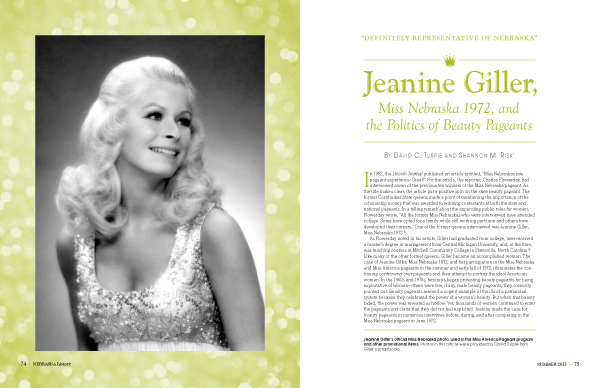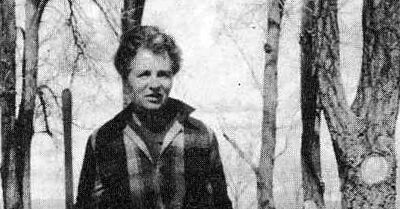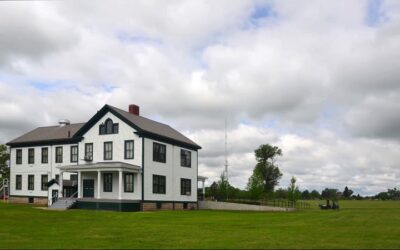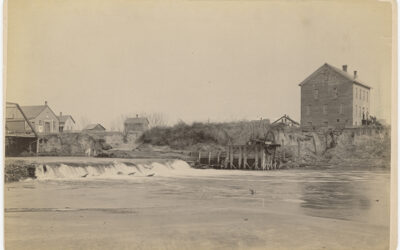 In 1982, the Lincoln Journal published an article entitled, “Miss Nebraskas rate pageant experience: Great!” For the article, the reporter, Charles Flowerday, had interviewed seven of the previous ten winners of the Miss Nebraska pageant. As the title makes clear, the article put a positive spin on the state beauty pageant. The former Cornhusker State queens made a point of mentioning the importance of the scholarship money that was awarded to winning contestants at both the state and national pageants. In a telling remark about the expanding public roles for women, Flowerday wrote, “All the former Miss Nebraskas who were interviewed have attended college. Some have opted for a family while still working part-time and others have developed their careers.” One of the former queens interviewed was Jeanine Giller, Miss Nebraska 1972.
In 1982, the Lincoln Journal published an article entitled, “Miss Nebraskas rate pageant experience: Great!” For the article, the reporter, Charles Flowerday, had interviewed seven of the previous ten winners of the Miss Nebraska pageant. As the title makes clear, the article put a positive spin on the state beauty pageant. The former Cornhusker State queens made a point of mentioning the importance of the scholarship money that was awarded to winning contestants at both the state and national pageants. In a telling remark about the expanding public roles for women, Flowerday wrote, “All the former Miss Nebraskas who were interviewed have attended college. Some have opted for a family while still working part-time and others have developed their careers.” One of the former queens interviewed was Jeanine Giller, Miss Nebraska 1972.
As Flowerday noted in his article, Giller had graduated from college, later received a master’s degree in management from Central Michigan University, and, at the time, was teaching courses at Mitchell Community College in Statesville, North Carolina. Like many of the other former queens, Giller became an accomplished woman. The case of Jeanine Giller, Miss Nebraska 1972, and her participation in the Miss Nebraska and Miss America pageants in the summer and early fall of 1972, illuminates the continuing controversy over pageants and their attempt to portray the ideal American woman. In the 1960s and 1970s, feminists began protesting beauty pageants for being exploitative of women—there were few, if any, male beauty pageants, they correctly pointed out. Beauty pageants seemed a cogent example of the ills of a patriarchal system because they celebrated the power of a woman’s beauty. But when that beauty faded, the power was revealed as hollow. Yet, thousands of women continued to enter the pageants and claim that they did not feel exploited. Jeanine made the case for beauty pageants in numerous interviews before, during, and after competing in the Miss Nebraska pageant in June 1972.
Beauty pageants have received scant attention from scholars. As historians Elwood Watson and Darcy Martin point out, most scholars probably view pageants as trivial events, while most feminist scholars undoubtedly “would dismiss writing about an institution that so clearly oppresses and commodifies women as a waste of time.” Most works on the Miss America Pageant take broad, sweeping views of the contest. Scholars, in fact, have probably paid as much attention, if not more, to the feminist protests and critiques of pageants as they have on views and experiences of pageant contestants. The experiences of one contestant allow for a more intensive study of the political dynamics of pageants during a time of rapid changes for women in America. Despite the feminist protests of the late 1960s and early 1970s, the show went on. Feminist groups correctly pointed to the negative aspects of beauty contests; yet that tells only part of the story. Jeanine’s experience as Miss Nebraska 1972 points to the good and bad qualities of the modern Miss America Pageant and its state affiliate pageants, and demonstrates that the pageant experience had the potential to empower women, even as it could also objectify them.
The entire essay appears in the Summer 2013 issue. Dive into stories like these and more by subscribing to our quarterly magazine. Learn more by clicking here.




